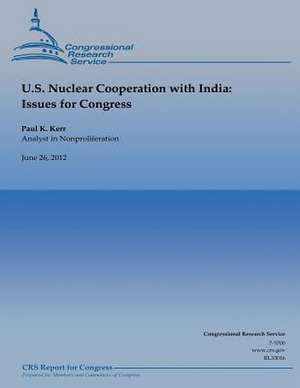U.S. Nuclear Cooperation with India
Autor Paul K. Kerren Limba Engleză Paperback
Preț: 95.48 lei
Nou
Puncte Express: 143
Preț estimativ în valută:
18.27€ • 19.08$ • 15.09£
18.27€ • 19.08$ • 15.09£
Carte disponibilă
Livrare economică 25 martie-08 aprilie
Preluare comenzi: 021 569.72.76
Specificații
ISBN-13: 9781482075878
ISBN-10: 1482075873
Pagini: 52
Dimensiuni: 216 x 279 x 3 mm
Greutate: 0.15 kg
Editura: CREATESPACE
ISBN-10: 1482075873
Pagini: 52
Dimensiuni: 216 x 279 x 3 mm
Greutate: 0.15 kg
Editura: CREATESPACE
